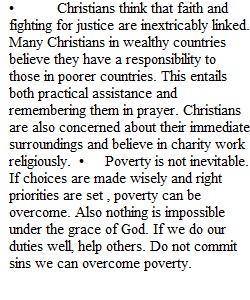


Q Getting Started As you read the information in the two assigned chapters for this workshop, keep in mind that while you will be learning about some complex and long-standing issues, your ability to understand and analyze them on a more nuanced level is an important factor in becoming a sound critical thinker about complex social problems. Also, consider nuanced and specific ways to perhaps influence or make some changes in these problems. Your Christian perspective may also help in dealing with these overwhelming problems; your personal faith, for example, can provide meaning and comfort. A sense of despair and feeling overwhelmed, on the other hand, which can come easily in the face of considering such complex and long-standing problems, do not lend to concrete solutions. Take heart in the fact that you and many others are all looking for ways to address these advanced issues. You are just beginning to learn about them, as well—possible solutions may appear to you later as you continue to reflect on the problems and learn how others have attempted to solve them. Upon successful completion of this discussion, you will be able to: • Develop a response to poverty from a Christian perspective. • Describe the various functions of poverty. • Compare and contrast the structural-functional and social conflict theories for social stratification and inequality. ________________________________________ Background Information What is poverty and why does it continue to exist in our so-called post-modern society and world? Is there anything you can do about it, and should you even try? Poverty, social stratification, and inequality are complex topics. Experts have been working for decades to find methods to address poverty and social stratification, sometimes with positive results, other times with less-than-stellar results. It is well established, however, that for many people, living in poverty results in poor outcomes in their education, goals, attitudes, behaviors, social life, and even brain development. Theories have been proposed to explain why poverty exists, but do these theories help you understand what to do about poverty? That is something for you to consider as you complete this assignment. This assignment provides you the opportunity to gain a better understanding of poverty, from both a Christian perspective and a sociological perspective. Due to the pervasiveness and intractability of poverty, it is well worth your effort to really dig deep and provide more critical and reflective discussions. Is there a way out of poverty? What can you do? You will address these and other important questions in this assignment. However, you are encouraged to not stop with this assignment; consider what you can do today, tomorrow and next year, if anything, about social stratification and inequality. ________________________________________ Instructions 1. Review the rubric to make sure you understand the criteria for earning your grade. 2. In your textbook, Sociology: A Christian Approach for Changing the World, read: a. Chapter 6, “Deviance, Crime, and Social Control” b. Chapter 7, “Social Stratification” 3. Download and review the following textbook PowerPoint presentations: a. Chapter 6(PowerPoint presentation) b. Chapter 7(PowerPoint presentation) 4. Visit the Urban Institute(new tab) website, whose mission is to “… open minds, shape decisions, and offer solutions through economic and social policy research.” You will find a number of engaging and thought-provoking reports that concern efforts to understand and solve real-world challenges such as poverty. 5. Watch the video The Way We Live-Ups and Downs: Social Stratification(new tab). 6. Navigate to the threaded discussion and respond to the following discussion prompts: a. Discuss Christ’s relationship to the underclass of society. What is the Christian response to poverty? b. Is poverty inevitable? Provide rationale for your response. c. Compare and contrast the structural-functional and social conflict theories for social stratification and inequality. d. What are the functions of poverty? e. How does one’s social class affect attitudes and life chances? 7. Your initial post is due by the end of the fourth day of the workshop. 8. Read and respond to at least two of your classmates’ postings, as well as all instructor follow-up questions directed to you, by the end of the workshop. 9. Your postings should also: a. Be well developed by providing clear answers with evidence of critical thinking. b. Add greater depth to the discussion by introducing new ideas. c. Provide clarification to classmates’ questions and insight into the discussion. d. Be posted on three different days during the workshop.
View Related Questions